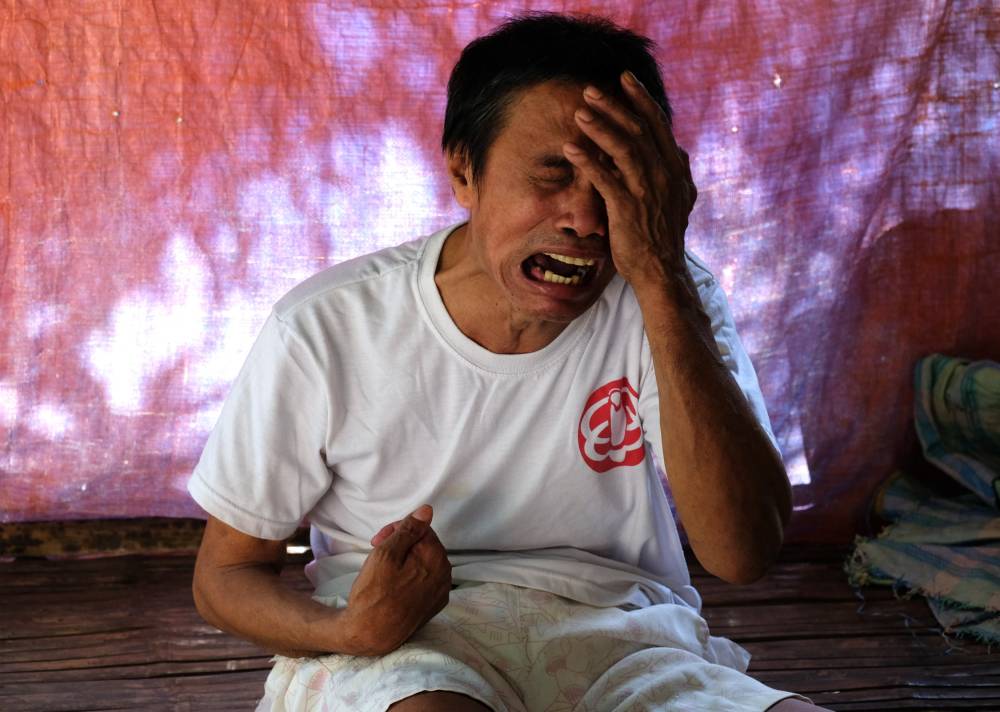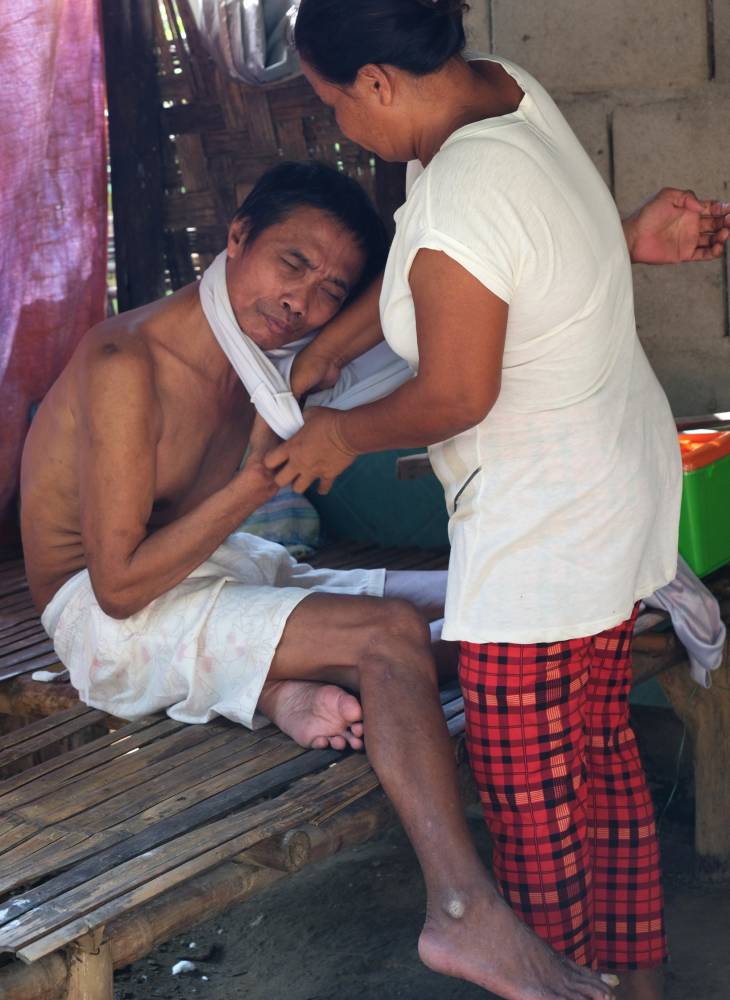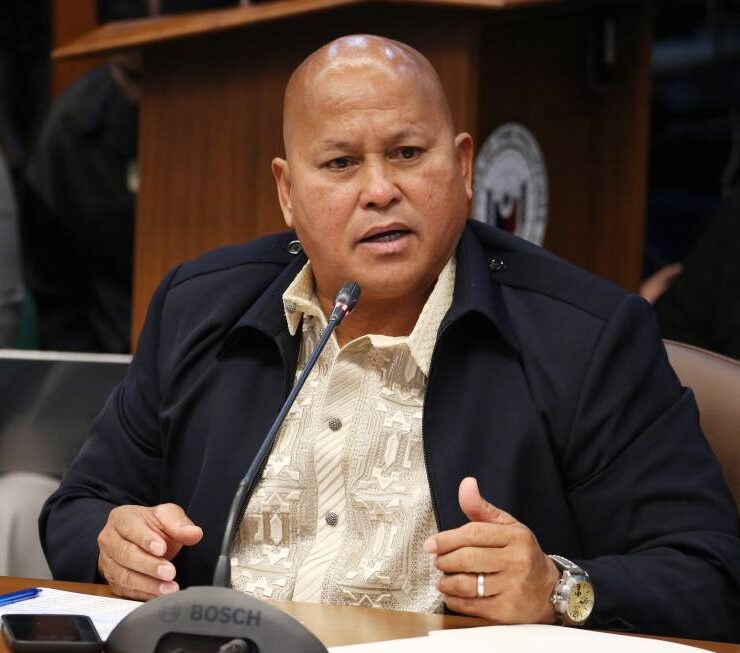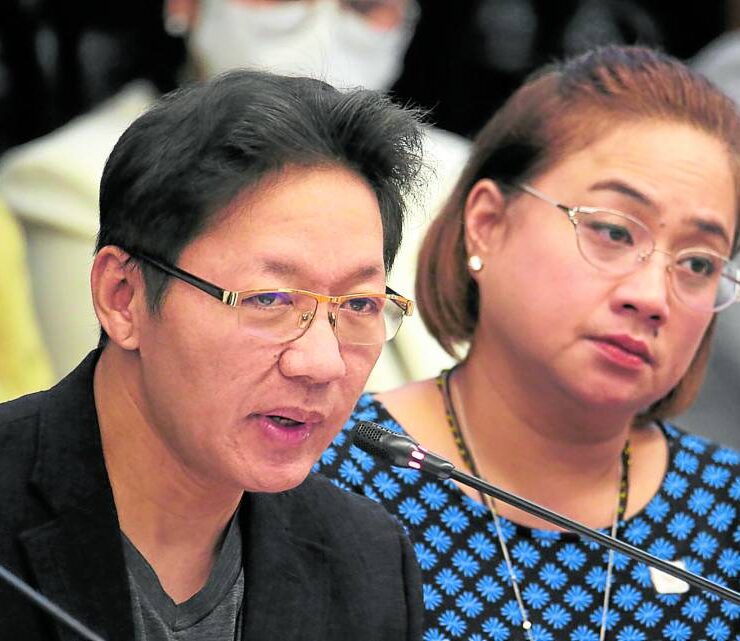PH fishers on Chinese bullying: ‘Babawiin ko’

As Philippine and Chinese officials clash bitterly over how to resolve their maritime dispute in the West Philippine Sea (WPS), the fisherfolk who consider it their traditional fishing ground face the everyday consequences of this tense situation.
Most of them are lucky if they were simply chased away by the China Coast Guard (CCG) from these waters. But others, like Delfin Egana, bear lifelong scars from encounters with the Chinese.
In June 2018, Egana, who is 54, and his companions had gone to Kalboro—the locals’ name for Panatag (Scarborough) Shoal (also called Bajo de Masinloc) that’s about 220 kilometers west of Zambales—to spearfish, as he had done countless times.
On that day in June, however, the Chinese coast guard, pointing guns at Egana and the others, confiscated their fishing equipment and their catch. When he tried to swim away with his last spear, they reeled him back with a hook used to reel in big fish. He was lucky it caught on to his shirt.
Stroke, paralysis
That incident so traumatized him that he suffered a stroke on the way back home to San Salvador Island, part of Masinloc town in Zambales province.
“He kept saying, ‘Babawiin ko, babawiin ko (I’ll take it back),” referring to the gear stolen from him, according to fellow fisher Henrelito Empoc. “He was still somewhat mobile then … then when they arrived at the shore of Masinloc, that’s when he collapsed.”Egana was disabled and depressed after that episode, but he became paralyzed after a second stroke in 2020, leaving his family without a breadwinner.“That’s the worst thing that has ever happened to a Filipino fisherman,” Empoc, who also serves as spokesperson for Bigkis ng Mangingisda Federation, said in a phone interview on Saturday.
He said that they reported the incident and “many other cases” to the Philippine Coast Guard (PCG) and the Bureau of Fisheries and Aquatic Resources (BFAR) “but it was like nothing to them, and it even felt like they were covering it up” at that time.
Not isolated
These stories, Empoc said, were not isolated incidents either. And as tension between Manila and Beijing rose, they called on the PCG “to protect them the same way that the CCG protected its own.”
“They may not be able to match China’s might, but it’s important that they do it for the Filipinos who depend on the WPS for a living,” he said. “They should do everything they can to keep us safe.”
Last week, Bigkis—whose members include fisherfolk from Palawan, Zambales, Bataan and Pangasinan who fish at the WPS—staged a protest in their small community on San Salvador against the continuing encroachments by the Chinese into their fishing grounds.
Empoc said they organized themselves with the help of the People’s Development Institute, a nongovernmental organization, in 2014 to show a united front as they fight for their rights as WPS fishermen. At present, their biggest work is documenting cases of harassments by the CCG “so that one day, we will be able to use this to assert our rights and demand justice.” While he is not able to give specific numbers, Empoc said the group has already recorded several harassment cases, which have escalated over the years.

Fishermen and their families on San Salvador island in Masinloc, Zambales, marched in protest
on Wednesday against continuing Chinese encroachments into their fishing grounds in the West
Philippine Sea (WPS), particularly in the waters of Bajo de Masinloc (Scarborough Shoal). PHOTO COURTESY OF BIGKIS
Brute force new norm
In the past, he said the CCG only shooed them away from Panatag’s lagoon where they usually fished—but now the Chinese no longer hesitate to use brute force, like ramming their boats.
Eddie Edora, another San Salvador fisherman, claimed that Chinese fishermen with protection from their coast guard have been harvesting giant clams and destroying coral reef in the area.
Many of Bigkis fisherfolk freedive in the WPS to spear fish. However, there have been cases where the CCG would force them to surface, confiscate their fish, and force them to walk barefoot over the coral reef, Empoc said.
This was the case for Ronie Drio, president of the Bigkis chapter in Zambales, who was once forced by CCG personnel to tow his boat while barefoot atop sharp corals. He bled from cuts to his feet, Empoc said.
Anxiety attack
The sight of a Chinese vessel triggers an anxiety attack in Drio’s son, Jury, who was with Egana’s group.
Such harassments, Empoc said, left deep trauma on fishermen like JR Ermita, who was also with Egana the day their fishing gear was confiscated and who was also once forced by the CCG to walk on corals. He has suffered a nervous breakdown and now stutters when he speaks. China’s incursions not only led to tense encounters between the fishers and the Chinese coast guard but also spreads hunger and poverty as they are no longer able to fish as freely in the resource-rich lagoon, Bigkis said in a statement.It cited Ronnie Masukol saying his income has been getting smaller with his meager catch as he has not been able to fish as much because of the CCG harassment, plunging him and his family into deeper poverty.
The group had brought these cases before the PCG and the BFAR under the previous administration, but they felt neglected, Empoc said.
They did, however, feel a “marked improvement” under the Marcos administration, with PCG aid missions for the fisherfolk.Bigkis believes that the government can still do more for the fisherfolk.
Apology, reparations
Among others, they demanded the full enforcement of the 2016 arbitral ruling, which invalidated China’s sweeping claims to the South China Sea, including the West Philippine Sea, waters within the Philippines’ exclusive economic zone.
They are demanding an apology and official reparations from China for the damage to the marine environment and trauma they have inflicted on the fisherfolk.
“Under the UN-sanctioned economic, social and cultural rights, China has an extra territorial obligation to pay for all the accumulated damage to the Philippine marine environment,” Bigkis said in a statement.
At the same time, they asked the Marcos administration to bring the Philippine case before an international legal body for conflict mitigation.
Empoc said that while he knew the PCG missions were “triggering” the Chinese coast guard into acting harshly, “this is better than the previous administration which seemed to be conceding the area.”
“Their mere presence gives us strength to carry on. The fact that we can see them, we feel more safe,” he said. “I know for a fact China will not go to war with us over just this and they are just triggering conflict—but if you really think about it, why are they so offended, when the WPS is ours?”
Empoc said they would continue to fight for the WPS, if only for the sake of colleagues like Egana, who had loved his fishing gear so dearly that the loss paralyzed him. Though left unable to speak after his stroke, Egawa’s vow—“Babawiin ko”—seems a fitting rallying cry for the fisherfolk’s determination. INQ





















